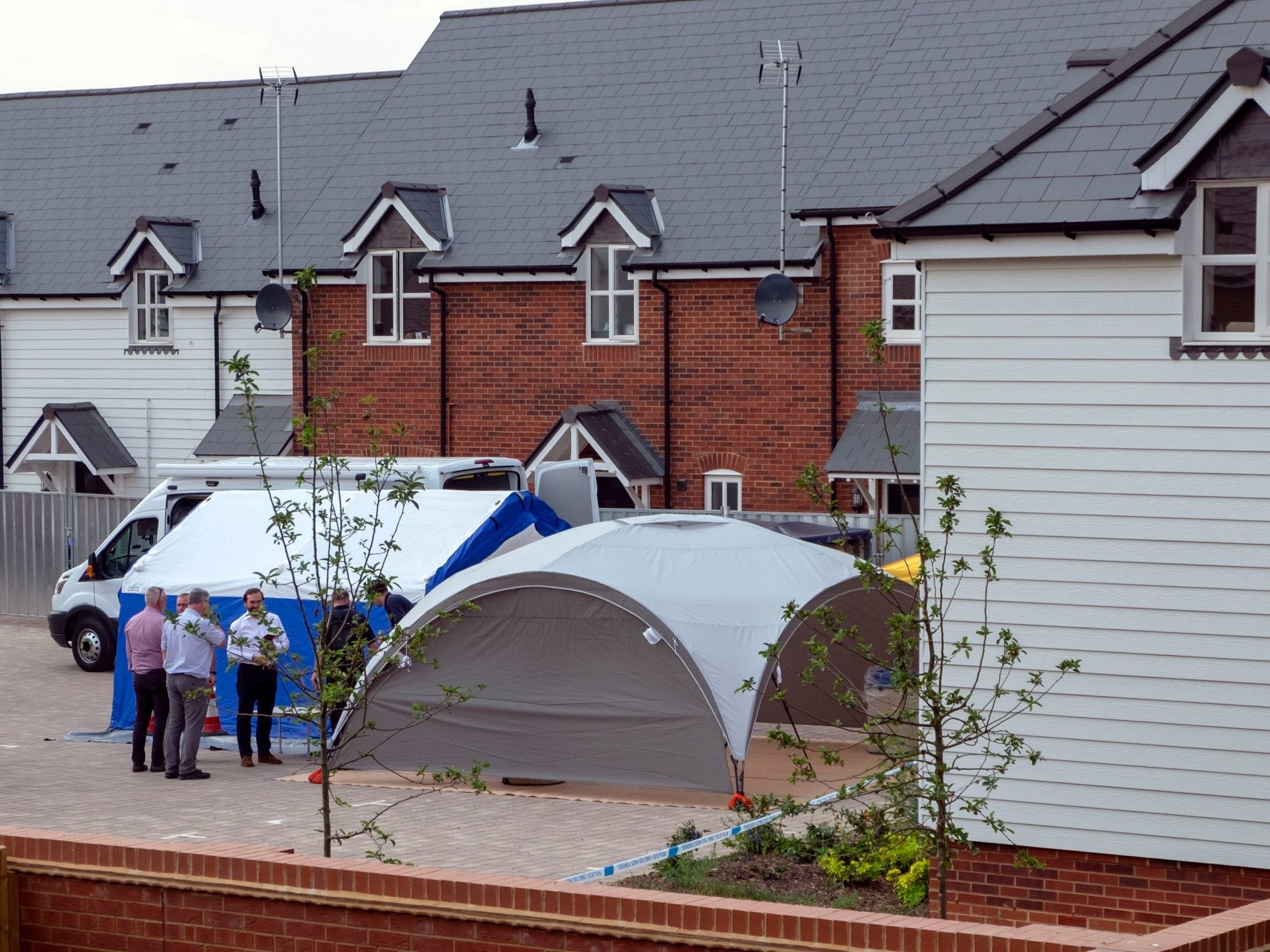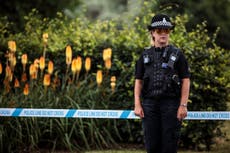Novichok poisoning latest: Couple in Amesbury exposed to toxin after handling contaminated item, police say
Public health authorities insist threat to Salisbury residents 'remains low'
Police are still hunting for the “contaminated item” that accidentally exposed a couple to the deadly nerve agent novichok – almost a week after they were left critically ill.
Dawn Sturgess and Charlie Rowley are thought to have been poisoned by remnants of the toxin used in the attempted assassination of Russian double agent Sergei Skripal and his daughter in Salisbury four months ago.
Officers have defended the decision not to warn the public over the potential risk until Wednesday, four days after the couple were taken to hospital.
Health authorities, which had believed traces of the nerve agent were removed in extensive decontamination efforts, insisted that the risk to the public was low, though people were warned not to pick up unknown objects.
It came as Sajid Javid, the home secretary, again blamed Russia for the “callous and reckless” attack on the Skripals – but Moscow denied any involvement.
Assistant commissioner Neil Basu, the head of UK counterterror policing, said: “Following further tests of samples from the patients, we now know that they were exposed to the nerve agent after handling a contaminated item.
“Detectives are working as quickly and as diligently as possible to identify the source of the contamination.”
Investigators have not revealed where the couple came into contact with the deadly nerve agent, but admitted that Ms Sturgess and Mr Rowley had not visited an area previously known to be contaminated

Emergency responders initially attempted to treat them based on the assumption they had taken contaminated drugs at Mr Rowley’s home in Amesbury.
Wiltshire Police chief constable Keir Pritchard defended the initial response as “entirely proportionate” on Thursday, saying he had personally spoken to the officers and commanders involved to voice his support.
Amesbury major incident after couple exposed to novichok
Show all 40“Based on the information we received from a friend who had been with the couple all day, alongside the initial medical diagnosis and items located in the address, there was a strong indication that the decline in their health may have been connected to a contaminated batch of illegal drugs,” he added.
“This formed our initial working hypothesis, so therefore our response based on that hypothesis was entirely proportionate.”
But staff at Salisbury District Hospital became increasingly concerned over their symptoms and sent samples to the Porton Down military laboratory on Monday.
The following evening, results came back indicating Ms Sturgess and Mr Rowley may have been exposed to a nerve agent and a major incident was declared.
The couple, who are in their 40s and both have children, had visited Salisbury city centre on Friday and collapsed hours apart the following day.
Cara Charles-Barks, chief executive Salisbury District Hospital, said both patients remained in a critical condition and described them as “acutely unwell”.
Around 100 counterterror detectives are working on the investigation, which could provide vital clues over the culprit behind the Skripal attack.
“Our strong working assumption is that the couple came into contact with the nerve agent in a different location to the sites which have been part of the original clean-up operation,” Mr Javid told MPs following a meeting of the government’s emergency Cobra committee.
“All sites which have been reopened have undergone vigorous testing and any items that may have harboured residual amounts of the agent were safely removed for disposal.”
Ben Wallace, the security minister, said Ms Sturgess and Mr Rowley were not directly targeted and had no link to the Skripals.
“The working assumption would be that these are victims of either the consequences of the previous attack or something else,” he told BBC Radio 4’s Today programme.
He suggested that the fact Mr Sturgess and Mr Rowley did not fall ill until the day after they visited Salisbury indicates that they may have been exposed to a lower concentration of novichok, which therefore took longer to be absorbed into their bodies and take effect.
John Glen, the Conservative MP for Salisbury, believes Ms Sturgess and Mr Rowley had come into contact with “discarded paraphernalia” from the Skripal incident.
“My strong instinct is that they have somehow encountered some discarded paraphernalia from the Skripal incident,” he added. “Novichok does not degrade of its own volition.”
Mr Javid reiterated the government’s accusation that the Russian government was culpable for the “reckless and callous” attack on Mr Skripal and his daughter and said international allies were discussing their response to the fresh incident.
“We will stand up to actions that threaten our security and the security of our partners,” Mr Javid said. “It is completely unacceptable for our people to be either deliberate or accidental targets, or for our streets, our parks or our towns to be dumping grounds for poison.”
The Russian government has denied involvement in the attack on Mr Skripal and any role in or knowledge of the incident in Amesbury.
Speaking at a press conference with journalists earlier on Thursday, Kremlin spokesman Dmitry Peskov claimed Britain had yet to produce any convincing evidence of either incident.
“At the very start, Russia offered a joint investigation,” he said. “The British side has shown no interest in our proposal.”
Chief Constable Prichard said he found it “unbelievable” for Wiltshire to be struck by another nerve agent incident, adding: “We, like our communities and the wider public, are shocked that a major incident of a similar nature has unfolded”
He praised the local community’s “extraordinary spirit and resilience” as people voiced their fear and anger, while the council moved evacuated residents into temporary accommodation.
A dedicated helpline set up after the Amesbury incident has so far received more than 100 calls and several people have presented themselves to Salisbury District Hospital for testing, although none were found to be affected by nerve agent.
Police urged people “not to be alarmed” by the reappearance of squads of police officers wearing protective equipment and go about their lives as normal.
Debbie Stark, deputy centre director for Public Health England South West, told a press conference: “Based on current evidence, the risk to the general public as a result of this incident remains low.
“I understand that people in Amesbury, Salisbury and those who have recently visited this area will be concerned but I want to reassure you that it is safe to continue your daily business.”
As a “highly precautionary measure”, she urged anyone who had visited cordoned-off areas frequented by Ms Sturgess and Mr Rowley from 10pm on Friday night to wash their clothing and wipe down personal belongings.
“Public should always be careful of picking up dangerous or unknown objects,” she added.
Subscribe to Independent Premium to bookmark this article
Want to bookmark your favourite articles and stories to read or reference later? Start your Independent Premium subscription today.





